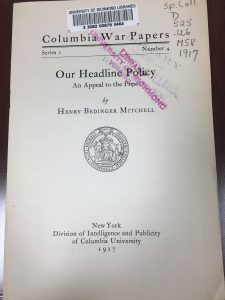
Along with “Rural Education in War” and “Mobilizing the Country Home Garden” as seen below, I chose to study a pamphlet of this same series entitled “Our Headline Policy”. This particular pamphlet was written by Henry Bedinger Mitchell and released in 1917 by the Division of Intelligence and Publicity whose intended goal throughout the entirety of the series was to emphasize “duties of American citizens in meeting the national need in the present war conflict”.
Although at first glance, I believed this pamphlet was going to explain the nation’s primary policy on war and an explanation of why it was happening, I was stunned to find that it details a literal Headline Policy outlining specifics of what rhetoric should and shouldn’t be used when discussing the war in periodicals and other news outlets. The intent of this pamphlet aligns clearly with the initiative spearheaded by men such as George Creel to spread American-centered information to a larger audience in the most effective way possible. It is almost ironic that there was a pamphlet, a common piece of propaganda, the do’s and don’ts of other news outlets spreading their propaganda.
However, before outlining the precise policy, it begins with a page of motivational rhetoric. When explaining the value of a headline’s ability to sway the public to unity, Mitchell uses analogies to classic American pastimes and sport by stating that Americans need to make “Team plays, sacrifice hits, and assists” as if they were attempting to win a baseball game. This device to sports strikes me as odd since it is appealing to an American sense of Individualism and the need to win while also highlighting the collective effort of the entirety of nation’s news writers in constructing unifying headlines.
Surprising the top recommendation for changing headlines is to place a large amount of value on the word “Our”. Instead of writing of “The Allies”, “The French”, “The British”, or “The troops”, the pamphlet pushes for substituting the “The’s to “Our”. Yet when referring to German troops or opposition forces, the pamphlet suggests that only the phrase “the enemy is acceptable”. The intentionality behind the word “Our” is both a method of Social Control and a means for unity and Americanism to spread. The intentionality of the phrase “the enemy” reminds me of the moment in All Quiet on the Western Front when Paul Baumer accidentally stabs a currently faceless soldier. By constructing headlines to strip the enemy of their identity, the rhetoric matches that of desensitization towards the violence when it occurs on behalf of “the other” or Germans.
To me, these shifts in wording matter more than just a method of convention and universal language of the press. A common psychological effect called the primacy effect demonstrates that the first words people see are the ones individuals are most likely to remember. If all headlines or most, are written to the standards of Columbia’s Division of Intelligence, this primacy effect would prove effective in bringing a sense of unity to the people that are part of the “our” and a universal hostility towards “the enemy”.

Yes! The irony here is great. Oy, UN-ironic sports metaphors. Perhaps you’ve hit the nail on the head: Baseball is both a team sport and one of individual achievement. The literal “writing” of an us vs. them narrative here is fascinating.